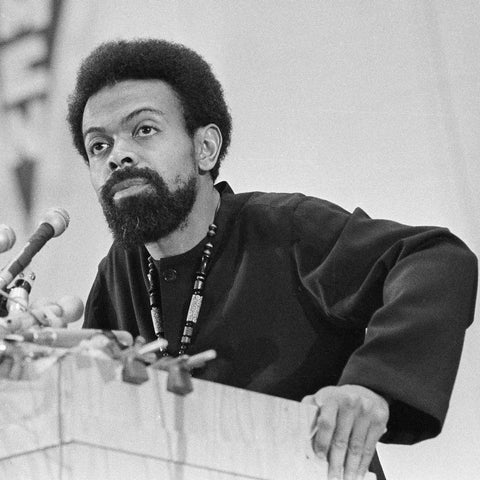Who is Gil Scott-Heron?

Gil Scott-Heron was a poet, musician, author, and larger-than-life figure who inspires generations of people through his music, books, activism, and the value of humanism that he fought for throughout his life. In his music, we can see how he distilled his struggles and observations into lyricisms and compositions best described as politically charged, eloquent, sorrowful, groovy, and full of vitality. His deliveries were bold and contained a sobering dose of hope needed to make us clear-headed to navigate in a societal maze full of hardships and difficulties.

Gil Scott-Heron was born in Illinois, Chicago, to Gilbert Heron, a Jamaican-born soccer player who was the father, and Gil’s mother, Bobbie Scott, was a librarian and a singer. After his parents divorced, he moved to Lincoln, Tennessee, to live with his grandmother, a civil rights activist and musician named Lily Scott, whose traces of influence was imperishable throughout Gil's professional and personal life. Other than inspiring him through her activisms, his grandmother introduced him to the works of great Harlem Renaissance poets and artists; a figure like Langston Hughes was one of them. She was also supportive of Gil pursuing and developing his artistic potentials. She even gave him his first piano that she bought from an undertaker.
As a black man in America, Gil was no stranger to racial discrimination, economic inequality, and rampant injustice. Those dismal realities became even more apparent to Gil when he moved from Lincoln to the Bronx, where he saw many African Americans living in decrepit housing projects and being deprived of opportunities. Gil lived his formative years while attending high school in New York. There, he encountered the work of Amiri Baraka, a prominent black writer who was also a big inspiration for Gil.

Many consider Gil Scott-Heron as the godfather of rap music. His concoction of combining spoken words poetry with irresistible funk rhythms inspired generations of rap artists in the following decades. In his debut album, “Small Talk at 125th and Lenox”, which was released in 1970 under Flying Dutchman Records, we can hear how he showcased his poetic sensibility in employing lucid syllables of social commentary and street wisdom about complex issues like police brutality, black brotherhood, and exploitation intermingled with percussive rhythms emanated from the simple formation of congas, bongos, piano, and guitar.

In the following year, Gil released one of his most essential albums titled “Piece of a Man” under the same label. This album features Gil’s expansion in his sonic spectrum, still with concise social commentaries and his proto-rap deliveries, most notably in the opening track, “The Revolution Will not be Televised”, where his graceful tirade was backed with a solid rhythmic jazz-funk performance. In the song “I Think I’ll Call it Morning”, we can feel hope and beauty amidst internal tribulation. The track opened with captivating phrases, ”I’m gonna take a piece of sunshine and paint it all over my sky …”, the song is also rich with melodies rooted in blues tradition, but with the metropolitan touch of jazz and funk. Other notable tracks in the album where he displayed his best performance can be heard in songs like “Lady Day and John Coltrane”, “Home is Where the Hatred Is”, and the title track “Pieces of a Man.”

Gil produced many other important works during his career, such as the collaboration LP with the keyboardist Brian Jackson titled “Winter in America” released in 1974 under Strata-East label, and “It’s Your World” released in 1976 under Arista Records. Overall, he wrote seven books, released 17 studio albums, nine live albums, various compilations and remixes, including “We’re New Here” that features Jamie XX’s rendition of Gil’s “I’m New Here”, the remix album was released under XL Recordings and Young Turks about a year before Gil passed away.

In May 2021, Gil Scott-Heron was immortalized in the Rock and Roll Hall of Fame, where he is considered a “teller of uncomfortable truths.”
Sources:Gil Scott-Heron Obituary - https://www.theguardian.com/music/2011/may/28/gil-scott-heron-obituary
Why Gil Scott-Heron’s ‘Whitey on the Moon’ still feels relevant today - https://astronomy.com/news/2021/07/why-gil-scott-herons-whitey-on-the-moon-still-feels-relevant-today
Who is Gil Scott-Heron (XL Recordings documentary) - https://www.youtube.com/watch?v=NH14L0IlduQ&t=2013s&ab_channel=XLRecordings
Gil Scott-Heron Biography - https://www.allmusic.com/artist/gil-scott-heron-mn0000658346
